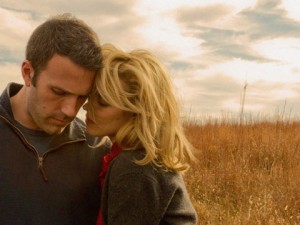Film Review: In Defense of a Cinematic Masterpiece — “To the Wonder”
By Gerald Peary
I almost didn’t go to it, dissuaded by a ** Globe review, a below-tepid 42% Tomatometer, and a view expressed again and again by top-line, American critics that director Terrence Malick has lost his bearings with To the Wonder, a movie banal and empty. But then two Eastern Europeans residing in Boston, one a film editor and the other a film theorist, assured me that To the Wonder is a cinematic masterpiece. Still dubious, off I tramped to the Kendall Square Cinema in Cambridge one recent afternoon. And I saw the best American feature by far of 2013: beautiful, compassionate, tragic, transcendent. And also touchingly human. The Tree of Life without the goofy parts: minus the wacky dinosaurs, the Sean Penn hug-in.
The story is simple: Marina (Olga Kurylenko), a young, Parisian divorcee with a daughter, meets Neil (Ben Affleck), a quiet American, and experiences a spiritual love bond, following him home to Oklahoma. After a time, the daughter feels alienated and friendless, so she and her mom pack for Paris. Neil takes up with a traditional religious woman, (Jane Rachel McAdams), who thinks herself used and tainted because they have sex and he doesn’t want to marry her. Afterward, Marina returns from Paris. She and Neil unite, then they fight and fight. And then there is a startling, sickening, self-hating episode in a motel. The devil reigns. . . .
Meanwhile, there is a lost padre, Father Quintana (Javier Bardem), who heals the sick and comforts the impoverished while questioning his faith, wondering if he hears the Lord. The figure is borrowed by Malick from The Diary of a Country Priest (1951), made by the greatest of religious filmmakers, France’s Robert Bresson.
Here’s what I tell my college film students: I’m a Jewish atheist who embraces religious/spiritual cinema. Because its inevitably serious-minded filmmaking. Because it’s inevitably weird and original. And so it is with To the Wonder, with its soaring and dipping camera, its radiant expression of a pantheist Christianity. The world out there, whether a glorious, Gothic monastery, a verdant park in downtown Paris, or a drab row of middle-class homes in small-town Oklahoma, it all shines equally with God’s magnificence. In Malick’s universe, marriage is a sacrament, adultery is a serpentine sin. But with repentance, and heartfelt forgiveness, there is, thank God, the doorway to Heaven. Stick to the end for Malick’s money shots: Paradise on screen.


I commend your thoughtful and well written review of To the Wonder. I think it was Oscar Wilde who commented that it takes a great critic to illuminate and enrich a great work of art. I look forward to reading more of your work.
Thanks, Donald. I’m really mystified why most of the Terence Malick true believers disavowed To the Wonder, a beautiful film. You can check out lots of my other reviews also published in The Arts Fuse and see if I am worthy of Oscar Wilde.